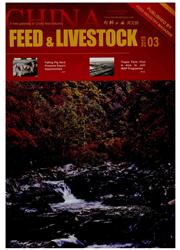

 中文摘要:
中文摘要:
试验以3头安装永久性瘤胃瘘管的山羊为试验动物,以纯淀粉和纤维素为底物,利用人工瘤胃体外培养法,通过产气量、纤维素的降解率、瘤胃液氨氮浓度,瘤胃液pH值,微生物蛋白含量这5个指标的测定,评价日粮碳水化合物结构(NSC/SC,淀粉:纤维素)为100:0、70:30、50:50、30:70、0:100的5种组合对瘤胃发酵及微生物蛋白产量的影响。结果表明:随着体外培养时间的延长,培养底物中的碳水化合物随着NSC水平的降低,累积产气量不断降低,瘤胃液pH值不断提高,原虫占瘤胃微生物的比重不断升高。在NSC/SC值为30:70时,纤维素的降解率和微生物蛋白产量达最高。瘤胃液氨氮浓度随着底物中NSC水平的降低变化不显著,但在培养后2h各组的氨氮浓度都达到最大值,随后便随着培养时间的延长而逐渐降低。
 英文摘要:
英文摘要:
Three goats fitted with rumen cannula were used to determine the effects of dietary NSC/SC ratio on the pH, NH3-N concentration, production of microbial protein, and cellulose degradability in the culture in vitro. The experimental results were described as follows: Gas production increased with NSC decreasing in the culture, while pH value and the proportion of protozoa increased gradually. Cellulose degradability and the yield of microbial protein were all highest when NSC/SC ratio in the culture was set to 30:70. NH3-N concentrations were not notable difference with varied NSC level in the culture, but it was the highest in all NSC/SC ratios at 2 h after culture, and subse- quently reduced with incubation time.
 同期刊论文项目
同期刊论文项目
 同项目期刊论文
同项目期刊论文
 The Preliminary Report on Rumen Protozoa Grazing Rate on Bacteria with a Fluorescence-labeled Techni
The Preliminary Report on Rumen Protozoa Grazing Rate on Bacteria with a Fluorescence-labeled Techni 期刊信息
期刊信息
